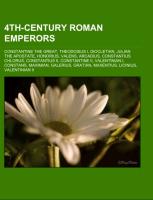4th-century Roman emperors
BücherAngebote / Angebote:
Source: Wikipedia. Pages: 71. Chapters: Constantine the Great, Theodosius I, Diocletian, Julian the Apostate, Honorius, Valens, Arcadius, Constantius Chlorus, Constantius II, Constantine II, Valentinian I, Constans, Maximian, Galerius, Gratian, Maxentius, Licinius, Valentinian II, Maximinus II, Jovian, Flavius Valerius Severus, Crispus, Constantius Gallus, Magnentius, Sextus Martinianus, Valerius Valens, Licinius II, Dalmatius, Vetranio. Excerpt: Constantine the Great (Latin: , c. 27 February 272 - 22 May 337), also known as Constantine I or Saint Constantine, was Roman Emperor from 306 to 337. Well known for being the first Roman emperor to convert to Christianity, Constantine issued the Edict of Milan in 313, which proclaimed religious tolerance of all religions throughout the empire. The foremost general of his time, Constantine defeated the emperors Maxentius and Licinius during civil wars. He also fought successfully against the Franks, Alamanni, Visigoths, and Sarmatians during his reign - even resettling parts of Dacia which had been abandoned during the previous century. Constantine built a new imperial residence in place of Byzantium, naming it Constantinople, which would later be the capital of the Eastern Roman Empire for over one thousand years. Hence known as the founder of Eastern Roman Empire and the first in line of Constantinople Emperors. As the emperor who used his government to empower Christianity throughout the Roman Empire and moved the capital to the banks of the Bosporus, Constantine was a ruler of major historical importance, but he has always been a controversial figure. The fluctuations in Constantine's reputation reflect the nature of the ancient sources for his reign. These are abundant and detailed, but have been strongly influenced by the official propaganda of the period, and are often one-sided. There are no surviving histories or biographies dealing with Constantine's life and rule. The nearest replacement is Eusebius of Caesarea's Vita Constantini, a work that is a mixture of eulogy and hagiography. Written between 335 and circa 339, the Vita extols Constantine's moral and religious virtues. The Vita creates a contentiously positive image of Constantine, and modern historians have frequently challenged its reliability. The fullest secular life of Constantine is the anonymous Origo Constantini. A work of uncertain date, the Origo focuses on military and political events, to
Folgt in ca. 5 Arbeitstagen
